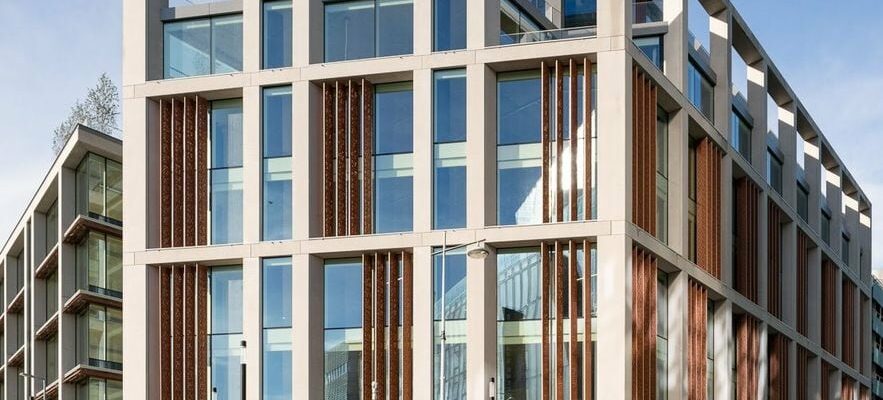“Here, it’s a bit like the Court of Justice, where we ensure that content related to elections complies with our rules. Over there, it’s our firefighters: this team intervenes immediately in the event of an incident. ” Lorenzo Andreozzi, project manager at TikTok, leads L’Express in a careful presentation of the Mission Control Center – or mission control center, in VF -, located at its headquarters in Dublin, Ireland. A name that was thought to be reserved for dangerous operations, such as the takeoffs of rockets launched at more than 40,000 kilometers per hour towards the deep darkness of space, but which applies here to the moderation of the European vote planned for this weekend on the continent. A critical event for a social network as popular as TikTok.
“This is the most complicated election in the world, with 27 countries voting at the same time, in different systems and languages,” says Lorenzo Andreozzi. The staging is deliberately worked: the room, somewhat austere, is densely populated, with around fifty young employees – data scientists, analysts, fact-checkers, etc. – squeezed together on skinny desks where the elbows of some almost touch those others. On the walls, projected maps of Europe with the number of moderated contents per country, updated live – except, for reasons of discretion, during the visit. Apart from the presenter’s voice, the silence of clicking mice reigns. All eyes are glued to the dashboards displayed on the screen, ready to light up at the slightest strangeness: a video that suddenly takes on a crazy scale, hundreds of similar dubious comments published simultaneously…
This tense atmosphere contrasts with the “coolness” modern premises and bright “Docks”, on the banks of the Liffey, where most of the American and Chinese tech companies operating in Europe have taken up residence. “Mission Control” never sleeps, “follows the sun”, underlines the guide: when it sets in Ireland, other teams take over elsewhere in the world, scrutinizing any alert coming from its thousands of moderators. TikTok claims the deletion of more than 95% of content violating its rules before even a single person has been able to view them, and the uncovering of 15 influence operations, through 3,001 associated accounts, since the start of the ‘year.
“No one does as much as us”
The social network of Chinese origin rarely opens its doors. But he knows he is very closely watched. By the DSA (Digital Services Act), the digital legislation of the European Union. By the nations themselves, including France, vigilant in the face of foreign interference, particularly informational, through this type of apparently playful application. Finally, because its credibility remains to be demonstrated.
The day before our visit, a British NGO, Global Witness, questioned TikTok’s ability to be effective in dealing with disinformation. Among 16 advertisements offered on the platform aimed at the Irish public and containing erroneous information about the elections, all were validated by TikTok teams. This was not the case on YouTube or X (formerly Twitter). “An error in human moderation,” Susan Moss, head of public policy and government relations in Ireland, pleaded with L’Express, who also ensures that the problem was quickly dealt with.
TikTok’s offices in Dublin, near the Docks where many tech companies are located.
© / The Sorting Office / Facebook
Despite transparency efforts, TikTok is still struggling to convince. On the subjects of disinformation, given the scale of the task, but not only. The network, pinned down for its “Lite” version, which it had to withdraw, is the subject of a European investigation concerning the protection of minors. The other hot issue concerns the security of personal data.
In Dublin, TikTok was unable to give a deadline for the localization, on the continent, of the precious “data” of its 140 million European users. They are currently located in the United States, Singapore or Malaysia. Three data centers are to one day take over in Ireland, as well as in Norway, as part of the project called Clover (Clover), for which TikTok is investing $12 billion. The company also has difficulty explaining clearly what information will be stored and protected there. Then which could be transferred elsewhere, in particular for questions of reliability of the service delivered almost everywhere in the world, outside China, and improvement of its recommendation algorithm, the secret recipe of which is jealously guarded.
Doubts remain, finally, about where decisions in this matter are made. Is it mainly in China? Last summer, a French senatorial report, very critical of the application, pointed the finger at Clover, judging it “insufficient”: “The location of data storage and processing infrastructures is only one element of a larger and more complex value chain, which can lead, ultimatelyto subject the data of European users to extraterritorial legislation.” Including that of China.
TikTok is banking on its recent partnership with an independent auditor, British cybersecurity specialist NCC Group, to monitor its data flows. And definitely silence the critics, although the choice of a non-European company – for the protection of Europeans’ data… – may once again raise questions. In Le Figaro, Stephen Bailey, NCC’s privacy director, talks about “digital barriers” placed around user data, as well as “real-time control of the source code as well as any updates made.” From the Irish capital, TikTok indicates that this work has already begun. And that NCC was even “free to meet with governments”.
Faced with questions about its independence from China, TikTok seems to be feeling a certain weariness. “No one does as much as us,” whisper its managers. Perhaps forgetting the new challenges that this network poses in the eyes of Europe and the whole world.
.
